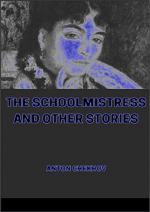Here was the train; the windows reflected the gleaming light like the crosses on the church: it made her eyes ache to look at them. On the little platform between two first-class carriages a lady was standing, and Marya Vassilyevna glanced at her as she passed. Her mother! What a resemblance! Her mother had had just such luxuriant hair, just such a brow and bend of the head. And with amazing distinctness, for the first time in those thirteen years, there rose before her mind a vivid picture of her mother, her father, her brother, their flat in Moscow, the aquarium with little fish, everything to the tiniest detail; she heard the sound of the piano, her father’s voice; she felt as she had been then, young, good-looking, well-dressed, in a bright warm room among her own people. A feeling of joy and happiness suddenly came over her, she pressed her hands to her temples in an ecstacy, and called softly, beseechingly:
“Mother!”
And she began crying, she did not know why. Just at that instant Hanov drove up with his team of four horses, and seeing him she imagined happiness such as she had never had, and smiled and nodded to him as an equal and a friend, and it seemed to her that her happiness, her triumph, was glowing in the sky and on all sides, in the windows and on the trees. Her father and mother had never died, she had never been a schoolmistress, it was a long, tedious, strange dream, and now she had awakened....
“Vassilyevna, get in!”
And at once it all vanished. The barrier was slowly raised. Marya Vassilyevna, shivering and numb with cold, got into the cart. The carriage with the four horses crossed the railway line; Semyon followed it. The signalman took off his cap.
“And here is Vyazovye. Here we are.”
A NERVOUS BREAKDOWN
A medical student called Mayer, and a pupil of the Moscow School of Painting, Sculpture, and Architecture called Rybnikov, went one evening to see their friend Vassilyev, a law student, and suggested that he should go with them to S. Street. For a long time Vassilyev would not consent to go, but in the end he put on his greatcoat and went with them.
He knew nothing of fallen women except by hearsay and from books, and he had never in his life been in the houses in which they live. He knew that there are immoral women who, under the pressure of fatal circumstances—environment, bad education, poverty, and so on—are forced to sell their honor for money. They know nothing of pure love, have no children, have no civil rights; their mothers and sisters weep over them as though they were dead, science treats of them as an evil, men address them with contemptuous familiarity. But in spite of all that, they do not lose the semblance and image of God. They all acknowledge their sin and hope for salvation. Of the means that lead to salvation they can avail themselves to the fullest extent.




